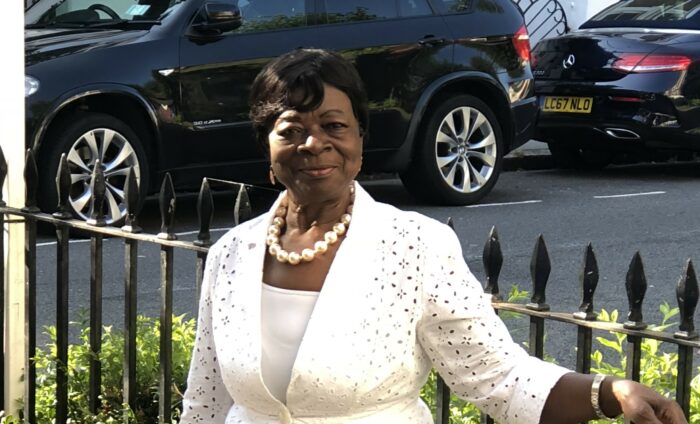We recently supported an inquest into the death of Odile Ngom, a mother-of-three who was being treated for coronavirus. Mrs Ngom tragically died after her catheter was left open to the air, resulting in irrecoverable brain damage – but the exact circumstances surrounding the fatal incident remain unclear.

Odile Ngom (pictured) was rushed to Chelsea and Westminster Hospital by ambulance on 18 January 2021 with coronavirus. Due to her severe symptoms, the 68-year-old – who lived in Fulham, West London, but was born in Cameroon, Central Africa – was sedated and put into an induced coma. Mrs Ngom deteriorated rapidly on 20 February – a couple of hours after having a new catheter fitted. It was later discovered that a cap on the CVC line that was used to administer medicine had been left open to air, which caused brain damage and led to her death on 24 February 2021.
Timeline of events
Mrs Ngom was admitted to Chelsea and Westminster Hospital after testing positive for Covid-19. When in the hospital, she was breathless, and X-rays and blood tests confirmed she had a more severe presentation of the virus, with evidence of myocardial and renal damage. After her admission, Mrs Ngom – who worked as a cleaner in London – was sedated, intubated, and put into a coma. She was deemed to have heart muscle damage and treated with aspirin and an anticoagulant to prevent thrombotic events. She also required dialysis due to an acute kidney injury.
With treatment, Mrs Ngom showed improvements and on 1 February, she was fitted with a tracheostomy to free her mouth from intubation and begin removing her from her coma. On 20 February, she required a catheter change for her renal replacement therapy. Due to blood clots impeding her blood flow, the insertion of the catheter took a few attempts before being successfully placed. During the setup of the renal replacement therapy machine, a step was skipped and subsequently an alarm bell rang alerting to air being either in the blood or the line.
Mrs Ngom suffered two deteriorations that day when her oxygen levels dropped significantly. Initially, it was not clear what had caused the deterioration, but a bedside echocardiogram was performed, which revealed air bubbles in the chambers of the heart. A CT scan confirmed there were multiple air bubbles in the brain.
An inspection following the deterioration found that a bung was missing from the CVC line and a bedside nurse stated that the catheter had been unclamped with an open tap and an absent bung when she had started her shift 20 minutes earlier. Formal brain stem tests on 24 February confirmed Mrs Ngom had suffered terminal brain damage and her life support machine was turned off.
The inquest
An inquest into Mrs Ngom’s death took place at West London Coroner’s Court on 22 and 23 February, and 20 March 2024. Assistant coroner Priya Malhotra concluded that Mrs Ngom died as a result of an iatrogenic air embolism following medical treatment. However, the coroner could not say how or when this had happened. The coroner had to weigh up several incidents that had occurred to determine the most likely incident that led to Mrs Ngom’s death.
Marie Edwige Roger, Mrs Ngom’s daughter, whose father also died due to coronavirus two days before her mother, said: “My entire family has been devastated by my mum’s death and we all feel lost without her. I hoped she would make a full recovery and that I would be able to be with her again. Her condition was improving slowly but it was promising. However, the incident destroyed all hopes I had.
“There isn’t a single hour when I do not think about my mum – how unfair her death has been and how many years she has lost to see her six grandchildren grow up. Unexpectedly becoming an orphan at my age is excruciating and the circumstances of my mother’s death is a severe trauma that will stay with me for the rest of my life.”
A note from our medical negligence specialist
Francesca Grossman, our medical negligence solicitor, assisted Mrs Ngom’s family in preparation for the inquest and is assisting with a civil claim against Chelsea and Westminster Hospital NHS Foundation Trust, which runs the hospital.
Francesca said: “This is a truly heartbreaking case that occurred against a background of the Covid-19 pandemic. Mrs Ngom attended hospital with coronavirus symptoms and was put into an induced coma for four weeks. While she appeared to be making improvements, her stay ultimately culminated in an episode whereby air entered her bloodstream and transited to her brain, causing widespread injury and her premature death.
“Unfortunately, the inquest was unable to answer many of Mrs Ngom’s family’s questions, most notably how and when the CVC line had been left open to air. What it did resolve was that it was this incident – and not other incidences that occurred throughout the day – that most likely led to Mrs Ngom’s tragic death. We are currently working with her family to resolve a civil medical negligence claim against the trust to get some justice for her and allow the family to grieve.”
Barrister Afiya Amesu, from No 5 Chambers, represented the family in court during the hearing.



